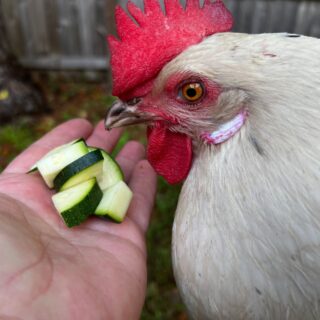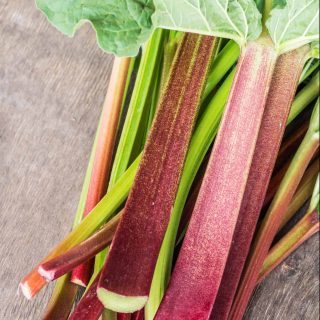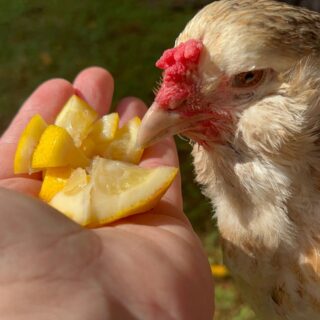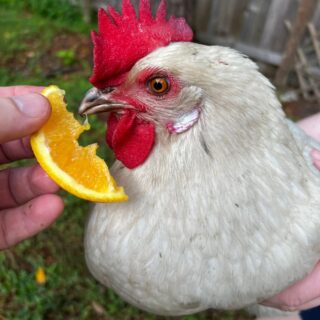Yes, chickens can eat asparagus - raw, cooked, different varieties and all parts of the asparagus. Asparagus also is chock full of nutrients that are essential to your chickens health such as Vitamin A, Vitamin K, antioxidants and amino acids.
If you keep track of your backyard chickens health and also like to give them treats once in a while, you know that while some things are good treats, others are not. So, let's dive in and see if where asparagus falls!
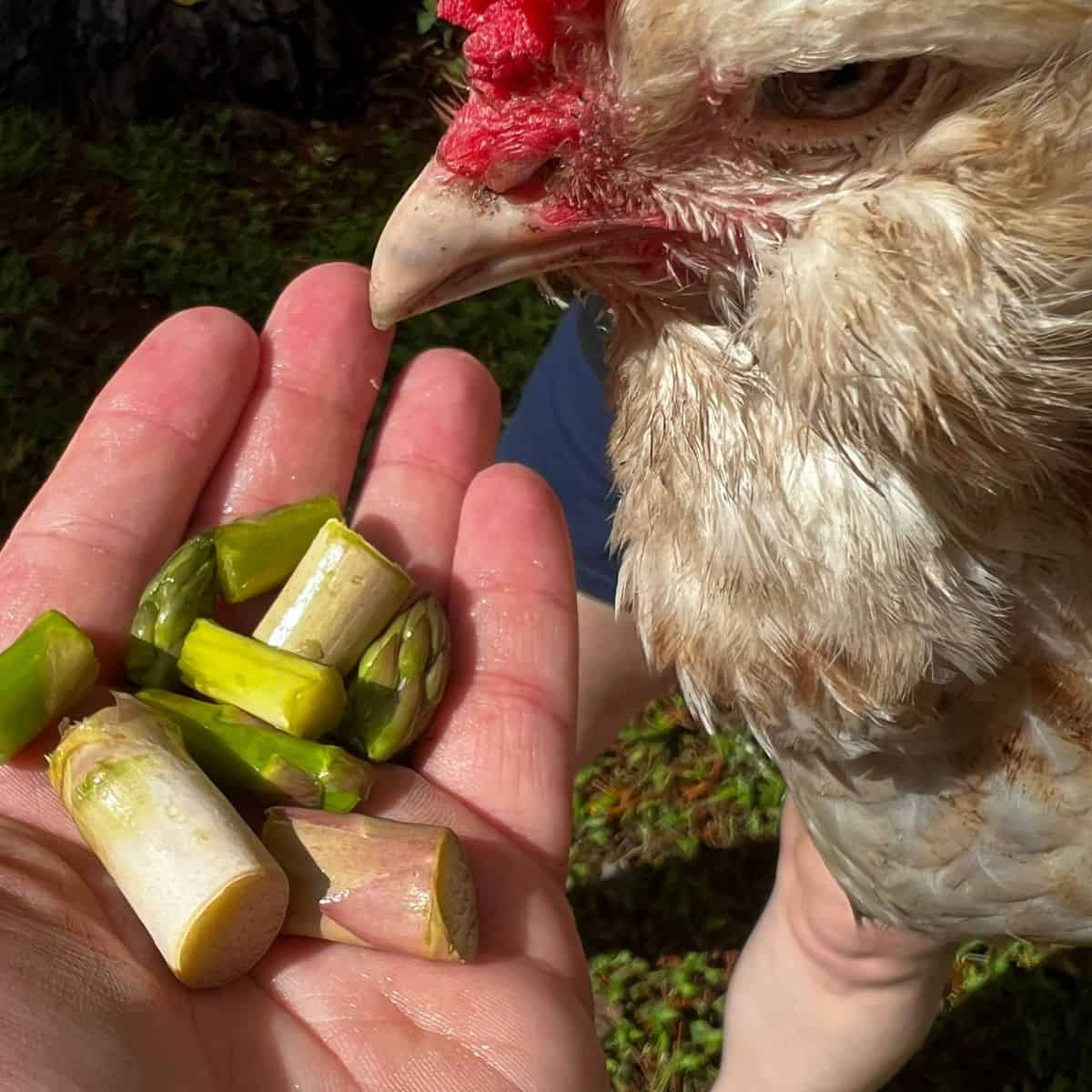
Jump to:
Can Chickens Eat Asparagus?
Chickens can eat asparagus, but just like when chickens eat radishes or when chickens eat peanuts, it may take them a little bit of time to test the asparagus out. This is just because it is not brightly colored or intensely fragrant.
However, once they start giving it a few pecks, they will usually enjoy it and keep on going until they have gobbled up whatever you have given them.
Of note, asparagus does contain a tiny bit of oxalic acid, it's nowhere near the levels that something like rhubarb is and therefore is perfectly fine. In fact, chickens can eat rhubarb also, but must avoid the leaves where that high oxalic acid content is.
How do you feed asparagus to chickens?
Feeding your chickens asparagus is pretty easy. It is important to understand, in general, how much feed chickens eat. That way you don't end up overfeeding them with treats.
Your options for feeding asparagus essentially break down to raw or cooked. Let's look at the benefits and drawbacks of either method.
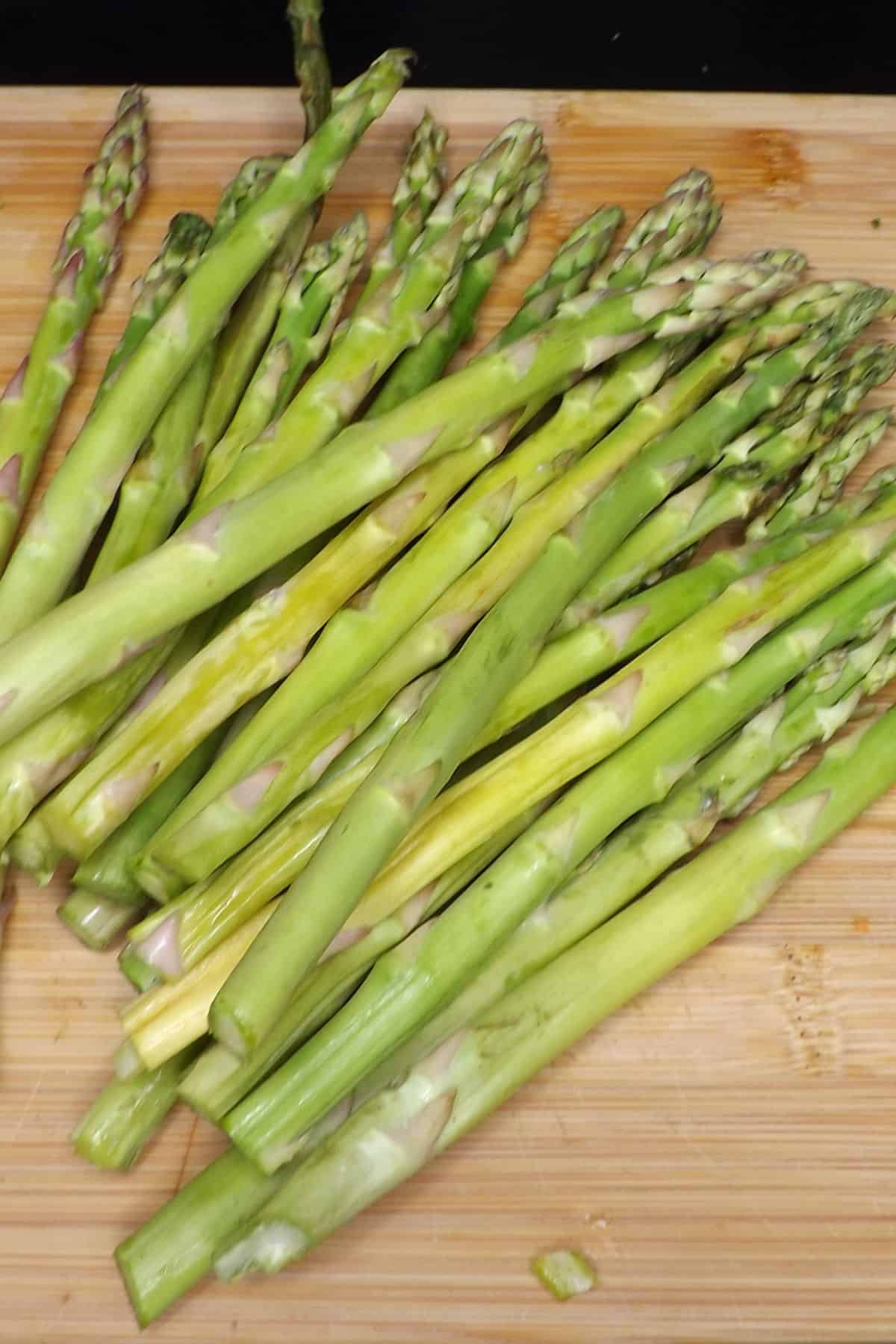
Raw
Feeding it fresh or raw is really easy. And can actually be done for a variety of chicken treats, like when feeding chickens sweet potatoes. Simply wash it off, cut it up. Then some raw asparagus where your flock gathers to eat
If they have never had asparagus before it may take them some time to try it out. But, eventually, one brave chicken will, no doubt, mosey over and start pecking away, thus, triggering an entire feathered cavalcade of peck happy chickens.
A few problems can arise in that scenario. If there is not enough asparagus to go around, the chickens may start fighting which can lead to injuries.
Another, sometimes related, issue is asparagus is pretty hard. Because it's so tough, and chickens may be in a rush to peck and run with their food, it can quickly become a choking hazard.
Cooked
Cooked asparagus is, in our opinion, a much better option. It will take a little bit longer but you don't have to do anything fancy. Simply boiling them will soften them up enough to make them easier to eat and digest. (You also want to cook other chicken treats, like when chickens eat rice).
It's easy to do. Wash the asparagus off, toss it into a pot and boil it. Then cut the asparagus up into small, chicken bite sized pieces.
This way you can scatter a much larger area so each chicken will get some and be less likely to fight. And the smaller pieces are easier to eat.
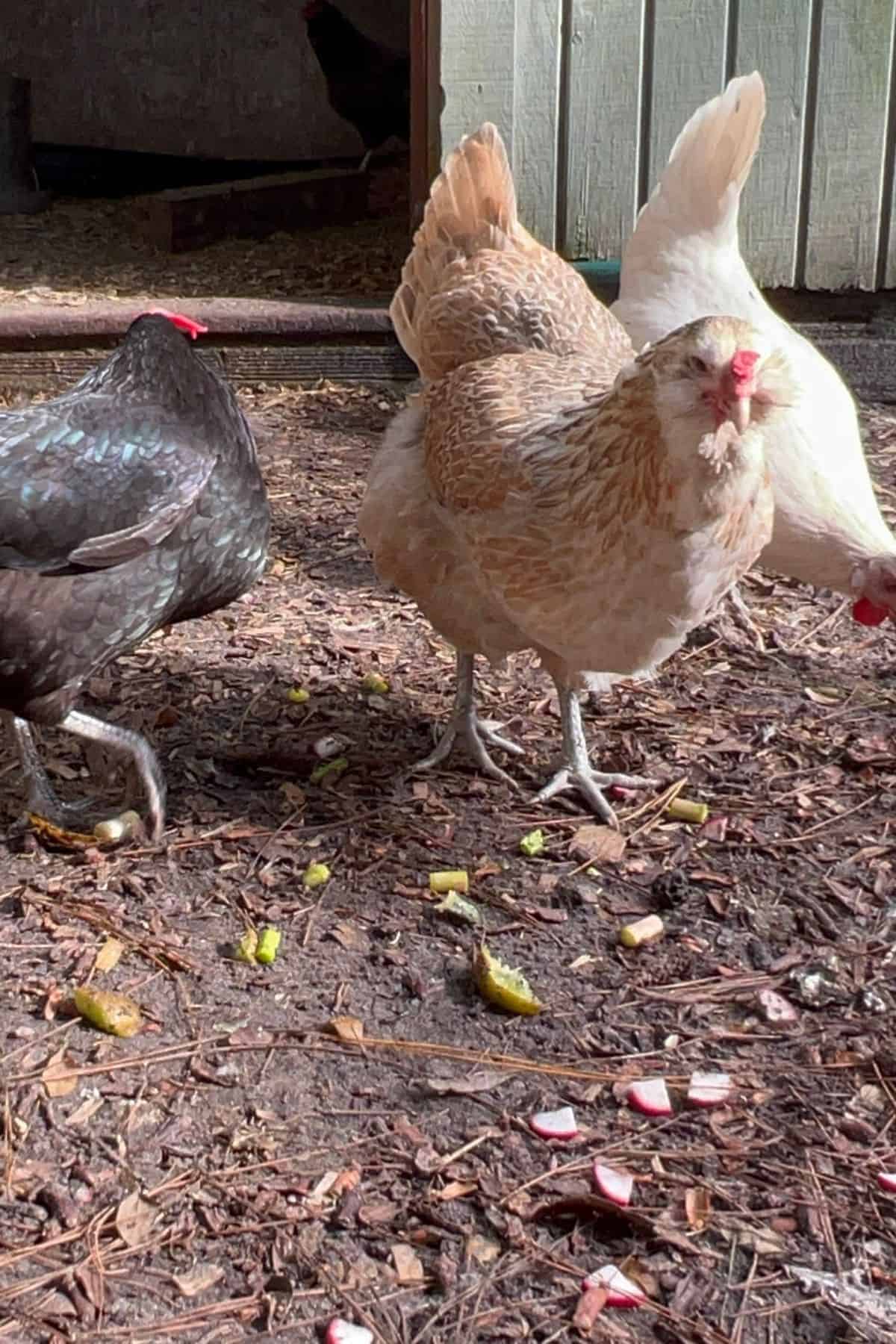
Benefits of Asparagus for Chickens
Asparagus is a super healthy and nutrient packed treat to feed your chickens. There are a wide range of benefits that it can deliver to your flock.
- Hydration: you might not think so, but asparagus is almost 94% water. Therefore, it is an extremely hydrating treat to give your chickens. In fact, it ranks right up there with feeding chickens watermelon in terms of hydration benefits. Chickens can eat cantaloupe and chickens can eat peaches also if you are looking for additional hydrating treats.
- Vitamin K: asparagus is a great source of Vitamin K. This vitamin plays an essential role in blood clotting and bone density in chickens. It has been shown that if a hen is deficient in vitamin K, that deficiency can be passed along to her chicks as well.
- Antioxidants: asparagus is jam packed full of antioxidants like vitamin E, glutathione, polyphenols and flavonoids. Glutathione and flavonoids both play a role in helping chickens respond to stress, inflammation and other issues. One such example is that flavonoids have been shown to decrease the occurrence of necrotic enteritis.
- Fiber: asparagus has 1.8 grams of fiber in a half cup. Just like when chickens eat zucchini and when chickens eat figs, which also have substantial fiber, the fiber content helps all facets of their GI tract such as digestion and nutrient absorption.
- Protein: protein is found in asparagus as well. Protein is essential for any diet, but even more so for egg laying chickens. Egg laying chickens need upwards of 13 grams of protein a day. So, giving them a treat that has a little extra protein boost is very beneficial.
Need some help keeping your chickens health and care taken care of? Check out the Organized Chicken Keeper for an easy to follow system.
Types of asparagus
We all know of asparagus as the long, thin stalks we've seen bundled with a rubber band. But, did you know that asparagus is not only found as the traditional green veggie we all think of? There are actually quite a few different, and colorful, varieties of aspargus.
Different colors can indicate different nutrients. So, you may want to think about feeding your chicken some foods with other colors as well. For example chickens can eat tomatoes which are red.
Below we will review the three most popular asparagus colors and the specific health benefits those varieties can give your chickens.
Green asparagus
This is the most common, healthiest asparagus and the kind you will most likely give your chickens. You will likely find this in just about any produce department in any grocery store you walk into.
It is also widely available. It's darker green color is a sign, like with broccoli and zucchini (chickens can eat zucchini, too), that it is packed with vitamins, minerals, antioxidants, and overall general healthy goodness.
White asparagus
One interesting thing is that it gets it's color, or lack thereof, by being grown underground in complete darkness. The lack of chlorophyll, from sunlight, gives it a more bitter flavor than either other type of asparagus.
White asparagus is still a healthy treat for your chickens but it is not quite as nutrient rich as green and is much more difficult to find.
Purple asparagus
This is, by far, the coolest looking asparagus. It is only grown during a small time frame during the year and is a deep, rich purple due to the presence of anthocyanins, the same thing that give blueberries their color (chickens can also eat blueberries).
Purple asparagus is also the sweetest of the three strains due to it having "20% more" sugar content than white or green asparagus. While it's packed with as much sugar as feeding chickens cranberries, or feeding chickens raisins, it's probably best to stick with green or white over purple due to the sugar content.
Does asparagus change egg quality?
The jury is out on whether or not asparagus changes egg quality. Some people claim it doesn't at all while others claim a single feeding will do it.
We have given our chickens small amounts of asparagus, occasionally and never noticed a difference in the taste or quality of their eggs.
If there is a taste or quality difference, it is most likely due to the asparagusic acid found in asparagus. It's the same compound that makes your pee smell and can also give eggs a bit of a sulfur flavor.
Therefore, you should just give your chickens a very small amount to start to ensure that it doesn't effect the taste of their eggs.
Feeding Chickens Asparagus FAQs
Yes, chickens can eat asparagus stems. However, the stems are usually quite tough (especially if they are uncooked). So, you should cut it into bite sized pieces to make it easier for them to eat and peck.
No, chickens cannot eat asparagus ferns. And, asparagus ferns are a totally different plant.
Yes, chickens can eat the whole asparagus spear. But, to make it easier for them, it is best to cut it into pieces.
You should start with just a few pieces of asparagus per chicken one time a week or so. This way they can adjust to the new food and you can make sure you don't notice a difference in egg quality.
Yes, chickens can eat asparagus raw. Though, when it is served raw it can be rather tough so it may take them longer to eat.
If you need more help with taking care of your chickens, check out The Organized Chicken Keeper for a complete system for managing their health through keeping their supplies stocked and coop clean.

